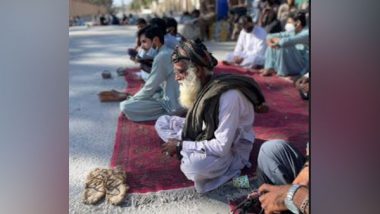
LAHORE: Farmers of the Thal desert have been waiting for the completion of the water cannel in the desert for a long time now. The opposition have raised concerns over the completion of the project.
Any further delay in the execution of the project, the farmers believe, would be akin to a conspiracy against the poor residents of the desert area who have been at the mercy of weather even to harvest a single crop (gram) for centuries.
“It is very astonishing that a province being led by a pro-people party for the last many years has opted to go against the benefit of the common people though the project is very much within all constitutional and legal bounds,” says Dr Amjad Magsi, a farmer of the Bhakkar district.
“Just imagine the contribution two million acres of now barren but fertile Thal land will make to the agriculture and national economy on the completion of the Thal canal. It will bring about prosperity for the rural community of the desert, which spans from Khushab up to Muzaffargarh (six districts).”
Shaukat Ali, a progressive farmer from Layyah district, says the national economy is getting damaged by blocking of an approved and partially constructed project midway in violation of the 1991 water accord (Water Apportionment Accord), which allows provinces to develop their irrigation system as per their share in the river waters.
Sindh opposed the canal project in a meeting of the Executive Committee of National Economic Council (ECNEC) held last Wednesday when Punjab put up the case there for changing funding resources for the project.
The GTC project had been approved by the Council of Common Interest (CCI), Central Development Working Party (CDWP) and Ecnec in the year 2001 while the Indus River System Authority (Irsa) had given water availability certificate for it in 2002 and reiterated the same in 2021.
The federal government had decided to fund the GTC in Punjab as well as Rainee and Chashma Right Bank Canal in Khyber Pakhtunkhwa and Kachhi Canal in Balochistan from its own resources.
Total cost of the GTC was Rs30bn and the first phase of the project was completed in 2005 at a cost of Rs10bn. The rest of the two phases were pending since then for want of funds.
Punjab went to Ecnec to get permission for funding of the rest of the project from the provincial resources. To the astonishment of Punjab, Finance Adviser Shaukat Tarin, who was chairing the meeting, referred the issue back to the CDWP when Sindh representatives Nisar Khuhro and Jam Khan Shoro objected to the project.
Rehmat Khan Wardag, president of Tehreek-e-Istaqlal, a staunch supporter of developing new water resources, wonders how Ecnec or the CDWP could block an irrigation project on any grounds other than financial for only Irsa has the authority to decide technicalities of a project. He regrets that earlier Kalabagh Dam had been politicised by Sindh and now the GTC, a canal being built with the provincial financial and water resources, is being objected to, notwithstanding the plight of the poor farmers of Thal, who are, so far, depending on rainfall to get just one crop in a year and sometimes that too is damaged due to drought.
Punjab Irrigation Minister Mohsin Leghari says they are working on water resource management as work on Dadhocha Dam in Potohar region and Jalalpur Canal is going on while tenders have been floated for Suwara Dam in Sulaiman Range, Dera Ghazi Khan. He says studies for more dams to harvest rainwater are being conducted, disclosing that water supply to new command areas will be provided through pipes to eliminate water losses, both due to evaporation and theft. He did not comment on the GTC issue.
Meanwhile, it is learnt that MNA from Khushab and Chairman of Standing Committee on Foreign Affairs Malik Ehsanullah Tiwana, who, as a precautionary measure, has quarantined himself after his bone-marrow transplant, has decided to call on Prime Minister Imran Khan to raise the GTC issue, which is a matter of life and death for the Thal farmers.






